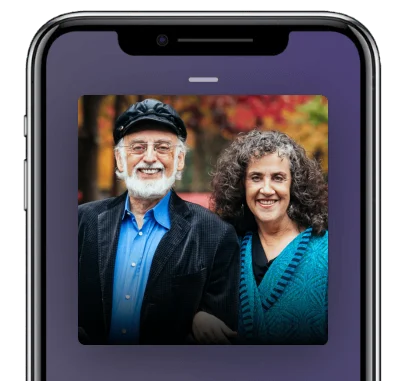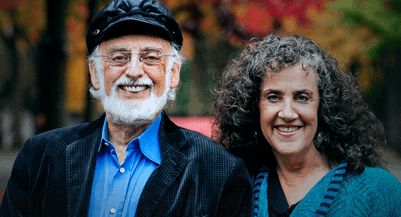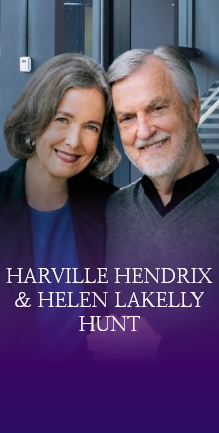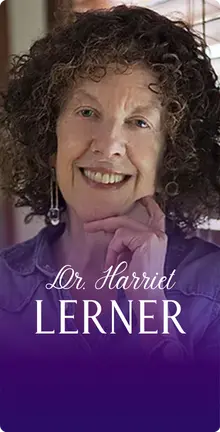In this Episode
- [00:39]Stephan introduces Drs. John and Julie Gottman, the founders of The Gottman Institute and Affective Software, Inc. They created the Gottman Sound Relationship House theory and Gottman Method Couples Therapy.
- [04:22]Dr. Julie explains the four types of negative communication styles in a relationship or what they refer to as “Four Horsemen of the Relationship Apocalypse.”
- [10:28]What is an emotional bank account?
- [15:13]Dr. John points out a mistake humans make when they try to change their partners to be like them, rather than revelling in their differences.
- [20:44]What are the two types of domestic violence? How to identify them and what is the safety plan in getting out of it?
- [26:05]How to recognize patterns of a person who is crazy-making or gaslighting?
- [32:28]Dr. John points out the need for grants to study domestic violence even though it’s the number one problem in love relationships.
- [37:31]Dr. Julie talks about their soon-to-be-released program called Couples Together Against Violence and a program she recommends, The Art and Science of Love.
- [41:06]Dr. Julie explains how to process a regrettable incident in a situation of domestic violence.
- [46:02]Visit Drs. John and Julie Gottman’s websites at gottmanconnect.com and gottman.com to get access to free resources and download their application, Gottman Card Decks, a relationship app from The Gottman Institute.
John and Julie, it’s so great to have you on the show.
John: Thanks, Stephan.
Julie: Thank you very much. We appreciate it.
First of all, I think we should probably talk a little bit about some of the most foundational stuff that you guys are known for. I’m thinking The Four Horsemen, micro-expressions, and how to make sure that you keep your relationship going. Maybe we could dive in right there with that.
Julie: Let’s begin with some of our research findings. We studied—mostly John and his wonderful colleague, Robert Levenson at the University of California-Berkeley—over 3000 couples by bringing them into a lab. Either a typical lab setting or an apartment lab where they stayed for 24 hours. The couples were videotaped, having conversations about everyday events and conversations about conflicts.
They were also physiologically measured for heart rate, for how much they perspired in their skin—a variety of other measures—to detect whether or not there was some physiological arousal present in either partner, particularly when they were discussing conflict. That physiological arousal proved to be very, very significant. Let me tell you a little bit about the findings.
The healthiest relationships were a climate of positivity.
First of all, they found that healthy couples during conflict had five times as many positive responses to each other as one negative. Five to one was a big ratio that really indicated people were more positive than negative, even during conflict. And during non-conflict times, it was 20 positive interactions to one negative. The healthiest relationships were a climate of positivity, overwhelmingly so.
We also found that couples who are not doing very well were really distressed, showed what we call The Four Horsemen of the Apocalypse during their interactions, especially the conflict interactions. That predicted five or six years down the road, some real troubles, if not divorce and separation. Let me tell you what those four are.
The first one is Criticism. By criticism, what we mean is blaming a problem on a personality flaw of the partner. For example, “You’re so lazy, and you’re thoughtless.” Criticisms like that. Or why did you say that mean thing? Even words like always or never, when they were attached to something negative, meant something critical was being said. The antidote the healthy couples to criticism did was speaking about themselves, describing their own feelings, the situation in their own needs rather than aiming their criticism at the partner.
Secondly, Contempt was a huge predictor of divorce or separation. Contempt meant criticism from a superior point of view. Really looking down your nose at your partner. We saw sarcasm, mockery, calling somebody a bad name. Those were forms of contempt. They not only predicted terrible dysfunction in the relationship, but they also predicted how many infectious illnesses the listener would get in the coming few years. In other words, contempt directly predicted a dampening of the immune system. Which these days, of course, it’s a very serious concern given we have COVID out there.
Every marriage has an emotional bank account. Pile up the positivity so that there's still enough in the bank to keep things going when conflict comes. Share on XThe third horseman was defensiveness. Defensiveness is probably the hardest one to overcome. John and I practice defensiveness as much as possible, which is a problem. We have to always work on it. Defensiveness means either counterattacking when you feel attacked saying something like, “Oh, yeah, well you didn’t pay the bills,” or kind of whining, not taking responsibility for something. Which would sound like I did too pay the bills. Whining and not taking responsibility for the problem is defensiveness. The antidote is to take responsibility for the problem.
The last horseman that was really interesting and tied to physiology was what we call Stonewalling. What stonewalling means is shutting all of your responses when you’re sitting with your partner and your partner’s trying to have a conversation with you. It’s not just for a few seconds. It’s probably for a few minutes or even longer. And what we discovered was that oftentimes, people who were stonewalling, who shut down and did not say a word back to their partner, did not even look at their partner. Inside, their bodies were in fight or flight.
Their heart rates were over 100 beats a minute, their blood pressure was higher, they couldn’t think straight, they couldn’t creatively problem solve. This is all a condition that goes along with being in fight or flight or what we call flooding. Those were some of the big research findings.
Wow, those are amazing. There’s one other piece that I think is important to bring to the surface. That is the importance of bids.
John: In the apartment lab, what we found when people were just hanging out together, quite often, one person would try to get the other person’s attention or interest and might say something to connect emotionally. Like, “Hey, look at that. That’s a beautiful boat going by,” Because the lab was on the Montlake Cut in Seattle, the camera operator would immediately switch one of the cameras to the partner to see what the response was.
What we found was when there was no response, which we call ‘turning away,’ that was a really bad sign. A lot of times people weren’t aware of the fact that this is important to really respond. But we found later on when a lot of the newlyweds had divorced six years later, when we look back six years earlier at their day in the apartment lab, on average, they were responding to their partner’s bids by turning toward, giving some response an average of 33% of the time. Whereas the couples who are still together six years after the wedding, when we look back there, their average was 86% of turning toward bids.
We realize that turning toward your partner’s need for emotional connection is building an emotional bank account in the relationship.
We realize that turning toward your partner’s need for emotional connection is building an emotional bank account in the relationship. It’s really critical.
If I say to my wife, for example, “Check out those lizards. They look like they’re staring at each other.” For her to respond positively and say, “Oh yeah, that’s pretty cute.” That’s important to the health of the relationship and to our ongoing connection.
John: Absolutely. It’s really the indirect way we let our partner know at the moment what we need. To turn away from that, ignore it, or be irritable when your partner asks for something, which we call ‘turning against,’ is really destructive to the long haul of the relationship.
You guys are very good at noticing microexpressions. Just a fleeting microsecond of contempt, criticism, or disgust even worse. That is very indicative that in years to come that couple won’t be together.
John: That’s right. We zero in on facial expressions and just turn the sound down and just code what the face is doing objectively. Those momentary flashes of disgust, contempt, or anger often don’t have words attached to them, really have an impact on the relationship. You’re still accumulating negativity in the relationship when you do that. It’s much better to really take those expressions and use them as a way to talk about what you feel and what you need with your partner. So your partner can respond to them and really try to give you what you need.
Would you guys say that we all have an emotional bank account and that we’re either making deposits and withdrawals depending on our behaviors towards the other?
Julie: Yeah. That’s a perfect description, as a matter of fact. Again, if you go back to that ratio of 5:1 or 20:1 during non-conflict times of positive to negative, what you want to be doing, especially with bids for connection, is just piling the positivity. It’s like gold coins, doubloons into the bank account so that when you mess up and you hurt your partner’s feelings, okay, there’s a withdrawal from the bank account, but you’ve got so much positivity to counterbalance that. That you’re still doing okay, there’s still money in the bank.

Awesome. What do you think or feel about the concept of a soulmate?
Julie: If you look around the world’s population, which is now about 7 ½ billion people, I’d say each person probably has at least 1000 soul mates. When people talk about a soul mate, a twin flame, or something like that, typically, what they’re really talking about is somebody who’s almost a clone of themselves who’s similar to who they are that they imagine they’ll be no conflict and everything will ride smoothly into the sunset. But the reality is that every person has their own delightful, unique, and sometimes very annoying idiosyncrasies.
Those characteristics make us who we are; wonderful and unique. It’s like pieces of a puzzle. If you think of yourself as multifaceted, you may find somebody that fits very nicely into 3 out of 10 of those facets, 4 out of the remaining ones are kind of mediocre, and then there are 2 or 3 that are horrific. You have to deal with that, right? That’s where conflicts come from. Especially the ones that last forever—perpetual problems.
Those characteristics make us who we are; wonderful and unique.
There’s another research finding we had where 69% of problems that couples struggle with are perpetual problems, they never go away. You have to learn how to talk about them, just dialogue about them, and accept the differences in your partner. It’s neither good nor bad, it’s just that you’re different based on either personality differences or lifestyle choices, lifestyle preferences. That’s okay. That’s part of what provides the juice in a relationship. That makes it spicy. That makes it interesting.
I couldn’t agree more. I have this great definition of a soulmate that I read. It’s from Edgar Cayce, who is a clairvoyant from maybe 80 or 100 years ago. He said, “A soulmate is an ongoing connection with another individual that the soul picks up again in various times and places over lifetimes. We are attracted to another person at a soul level, not because that person is our unique complement, but because by being with that individual, we are somehow provided with an impetus to become whole ourselves.”
Julie: That’s very nice.
John: That’s interesting. We talked about the good enough relationship. We’re not attracted to our clones. We’re attracted to people who are very different from us. Especially women are attracted to men who are really different from them and their immune system genes. The major histocompatibility complex. That’s really interesting. It’s research done by a German Scientist, Claus Wedekind. It hasn’t been perfectly replicated, but I think the finding is true that there is no algorithm that can predict who you’re going to like and who you’re going to be attracted to. But we’re certainly not attracted to a replica of ourselves, and we’re not attracted to people who are like us, like our brother or sister.
We tend to be attracted to people who we haven’t been raised with, who are very different and very interesting. The mistake is to then try to create them to be more like us rather than enjoying and reveling in the differences that make our life together really interesting. Julie is very different from me.
There is no algorithm that can predict who you’re going to like and who you’re going to be attracted to.
Julie: I was just going to say, a classic example is John and me. We are so different in so many ways. John likes to think of himself as an indoors man. He has a red leather chair, he loves to sit in the red leather chair all day and read math and physics. While my ideal activity, I’m an outdoors woman and I love to climb mountains. John also loves the sea, which is terrific.
What do we do together? He’s not going to climb a mountain with me, and I don’t want to sit around all day. What are we going to do together? We found the perfect activity for us which included sitting. We sit in a kayak, paddle out into the sea, and look at nature. John doesn’t get dirty and it’s perfect. He’s still sitting, we can talk, and we can enjoy the outdoors without much strain, and it’s a delightful experience.
John: We really enjoy each other’s company. I think that’s the basic thing. I hike with her too, but climbing a mountain, there’s not a cell in my body that wants to do that.
I’m guessing you’re not a camper either.
John: She wants to go up to Mount Everest base camp. A big difference between us, and yet we’ve really learned from each other’s differences and learn to enjoy them.
Very cool. What do you think of the concept or this idea, this belief that soulmates choose each other before they incarnate?
Julie: First of all, you have to believe in reincarnation. Two, you have to believe that we actually have a choice of who we come into the next life as. There’s a whole bunch of beliefs in there that are really, really interesting. I have no idea of whether they’re true—maybe, maybe not. It’s very hard for us to fully think that people are going to choose who they partner with when we’ve got domestic violence, we’ve got horrific dysfunctional relationships, we have betrayals, we have criminal activity, we have people who are so very, very sad together. Have they chosen also? If so that seems a little self-destructive.
The reality is that every person has delightful, unique, sometimes annoying quirks. The right relationship is where couples accept each other's differences. Share on XI’m really not sure. I tend to believe in reincarnation to some degree. But I guess I’ll find out. I’m now 70. I’ll find out in maybe 30 years or so.
Or 40 or 50. In Judaism, they teach to look for or to see the hand of God in absolutely anything and everything. Including domestic violence, horrible atrocities, and everything. The hand of God is in all of it. I’m curious what your take on that is, both of you.
John: One of the beliefs that Judaism propagated was that in order to be close to God, one should live a life of ethics, justice, mercy, charity, and compassion. It’s absolutely true that we need to have compassion for people who are violent at times. We have to understand that and help them with that. But people do have a responsibility for the evil they do perpetuate themselves. Once a year, we look inside ourselves and really try to change so that we’re closer to God, try to return to God, and live a life of morality, ethics, kindness, and compassion.
Nobody’s perfect. We need that course correction at least once a year. Hopefully, even more than once a year, if we’re really thoughtful. It’s true that we need to face the fact that the world is imperfect and have compassion for people who do make wrong choices, perpetrate racism, sexism, and lack of kindness. But we also have to take responsibility for the things that we do to hurt other people as well.
Very true. Let’s take the topic of domestic violence specifically. What do you guys see as the escape plan for somebody who’s being abused? How do they see it, recognize it? How do they seek help, and how do they execute it without falling into mortal danger?
Julie: That’s a really good question, Stephan. First of all, let me just introduce a little bit of nuance into the topic of domestic violence. Other researchers, as well as we, have found that there are two types of domestic violence.

What we call situational domestic violence does not cause major injury. There is not a clear perpetrator and victim. Both people tend to be violent. The violence usually occurs as a result of an escalated quarrel, and both people take responsibility for their own violence. It might be a push, a shove, a slap, something like that. They’re both doing that when they’re out of control.
What’s happening in those situations is that they are, again, physiologically flooded. They flip their lid, so to speak, as our beloved friend, Dr. Daniel Siegel, would say. They can’t think straight, can’t problem solve, and so they just simply react to each other, and sometimes that includes physical violence.
Now, that’s about 80% of the population of domestically violent couples. The other 20% consists of people we call characterologically domestically violent. Those people have a clear perpetrator and victim. Most of the violence is committed by a man on a woman. The woman can do nothing to stop the violence. The violence is used to intimidate, control, and create fear in the partner. There is major injury, there is mortal danger, and the perpetrator takes no responsibility, none, for the violence. Instead blames the victim.
In that 20%, what the victim needs to do in terms of a safety plan to get out is, first of all, make copies of all the important documents that are around. If she owns with her partner a house, a property, a car, or anything else, make copies of that. Make copies of insurance, make copies of birth certificates, marriage certificates, any financial bank statements, assets, and so on. Make copies of that and keep those out of the house. Keep them separately. Maybe at a friend’s house. Something like that where the perpetrator cannot find them.
The violence is used to intimidate, control, and create fear in the partner.
Spare set of keys, have those also. It’s almost like an emergency bag. How we prepare with bottles of water and canned food, incidentally a can opener. Very important to have the supplies you need elsewhere. Some clothing, children’s clothing, and so on.
Create a plan, typically, what works best is working with a counselor, a therapist, or somebody at an agency—a social worker perhaps, who can guide you as to where you can go if you leave. And make sure you have a place where there is either a security system involved, which might be a shelter, for example, a domestic violence shelter or at another person’s home who the perpetrator does not know and cannot identify. Make a plan to go, of course, when the perpetrator is not at home. Don’t do it in the middle of the night when the perpetrator is there.
It’s really about careful planning. I think the most important piece of someone getting away from a perpetrator is psychological preparation. In other words, oftentimes, these people have heard that they’re at fault, the victims, so many times that they believe it. They’ve internalized that message. What can really help is for them to talk to a counselor, a clergy, or someone who can say, no, this isn’t your fault.
And if anybody says it is, get out of there and find somebody else who can say this isn’t your fault. You didn’t do this no matter what you said. That does not lay the blame at your feet for being battered in the corner of the house. It’s very important to have that psychological preparation.
That’s great. If somebody is getting what’s called gaslighting, whether their reality is being denied, also known as crazy-making, how do they address that? Because not always do they have the ability to get away from the multiple people who might be doing that to them, not just the perpetrator.
John: What Neil Jacobson and I discovered in doing exit interviews with women who did get away were that they kind of gave up the dream that these men would change. There was usually the last straw incident that happened. Where they either felt in danger of their lives or felt that they couldn’t leave their children with this person in charge.
All genders, all combinations of sexual orientation, domestic violence is an issue
This last straw incident really can convince them that they had to do something that removes themselves and their children from the influence of this person who was gaslighting them. That really required believing that you’re entitled to live a life where you don’t get hit and you don’t get controlled. And so it’s that internal change that was really necessary—giving up that dream that these men would change.
One thing that’s characteristic of these particular guys where there is a perpetrator and a victim is they take no responsibility at all for the violence and think that the victim’s words justify the physical violence. When that pattern exists, then the woman or a man—if a man is victimized by a woman—needs to get away, or a man victimized by a man. All genders, all combinations of sexual orientation, domestic violence is an issue. Nobody deserves to get hit for any reason.
Julie: The other thing about gaslighting is that it’s actually very common, not only in physically abusive relationships but emotionally abusive relationships also. What can really help is to identify somebody who can reflect back to you your own reality and question what the perpetrator is trying to convince you is true.
That person can say something like, “Okay, you remember a picture hanging on the wall in that place and now your partner is saying there never was a picture there, there never was a portrait of your daughter there. Have you looked at the wall carefully to see whether the color where the picture sat is different from the color around where you think the picture sat?” Oftentimes they’ll say, no. “Okay, let me suggest you go back there and look. “
Sure enough, what they’ll find is that the space where the picture sat is lighter than the picture or darker (one of the other) than the surrounding color where the picture was. That tells them, wait a minute, I’m being lied to.
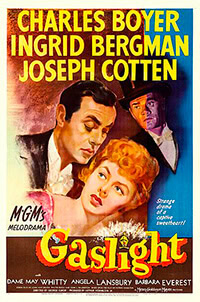
John: That’s from the original movie, Gaslight.
Julie: That’s right.
John: People should watch that.
Julie: It’s a perfect example. It’s fabulous. It’s a Hitchcock movie. It’s terrific.
John: That’s from the original Gaslight movie. It’s a really good example of how these characterologically violent men or physically abusive, psychologically abusive men often deny reality, their partner’s reality. It’s an effort to really control the mind of the victim.
Keep them kind of held down. I think about the baby elephant in the circus that would be tied up with a rope to a stake and it couldn’t move. And then when it became an adult, just having the rope around its leg, even if it wasn’t tied to anything, it would still think it was not able to leave.
Julie: That’s called learned helplessness found by a guy named Martin Seligman who studied that regarding the question many years ago. He discovered that even if you put an animal in a cage with a slight shock on the floor of that cage and the animal can’t get out, get too used to having to endure the shock. Then you open the door, the animal doesn’t leave the space there because that’s what it gets accustomed to.
Same thing with domestic violence victims. They really need that support to help them overcome what the perpetrator has taught them that they are powerless. That’s the message they’ve gotten. They’re powerless; they can’t do anything without the perpetrator’s ‘okay.’ They really do have agency over their own life and they can leave if they want to. They just have to be careful in doing so. To protect themselves, protect their children, protect their pets too.
Would you say that oftentimes, they have to hit rock bottom like that event that happens that finally convinces them? Like a rock bottom event, somebody who’s maybe addicted to drugs or alcohol has to hit rock bottom before they realize I need rehab?
Julie: Sometimes, I think that is true. There’s kind of the last straw as John was talking about. But I also think for others, I mean it’s a matter of luck in the sense of who else is in their lives and what’s happening if they have children. Do they have children who were getting beaten up? Because they’ll leave for the children sometimes rather than themselves. There are other factors involved, but certainly, that’s one of them.
Soulmates don’t necessarily mean two people so similar to each other they just click. It’s like two unique pieces of the puzzle that match with each other. Share on XWould you say that it’s possible to get somebody who is the perpetrator into some sort of anger management program to get them to change, or do you just have to figure they’re not going to ever change?
John: We just don’t know. Believe it or not, there’s essentially no funding to do research on this population. It used to be funded by the National Science Foundation, National Institute of Mental Health, but now there are just no grants available to study domestic violence. Even though it’s the number one problem in love relationships on the planet. Yet there is no priority to do research on this topic.
One of my former students, Neil Jacobson’s former student, Julia Babcock at the University of Houston, has been trying to get grants for 20 years in this area. There just aren’t any grant opportunities to study this.
We think that there’s a way to help these perpetrators. We have a little bit of evidence, Julia Babcock and I, that we can really reach them and that we can understand their psychology and what motivates them. But we really have to be able to do the research and do the standard gold treatment where we have a control group and an experimental group. For that, you really need a laboratory and you need a research grant to fund it. It needs to be made a priority by the federal government in order to do research in this area.
I’m not going to hold my breath for that one, unfortunately.

Julie: The good news, Stephan, is that we have done research on treating situational domestic violence. We did a big study where the treatment consisted of small groups of couples. Say five or six couples, meeting every week for two hours with two facilitators for about 20 weeks or so.
What we did was a combination of things. We worked very hard on creating group connections. We knew that the couples would connect with each other and come back week after week. That’s what we really wanted to strengthen. In addition, we gave them quick little teachings and exercises to do to change the skills as well as their deeper understanding of their partners, of themselves, and of how to deal with conflict, as well as how to build friendship, connection, passion, and romance.
That group was compared to a group that did not receive that kind of treatment. There were about maybe 70, 80 couples in each of the treatment and non-treatment cohorts. What we found is that at the end of that 20 weeks up to a year and a half later where we did follow-up research, we had eliminated domestic violence entirely. We also decreased hostility, increased conflict management skills, and deepened friendship. A very important part of this program involved teaching the couples with a little device called the emWave.
We gave them exercises and teachings to deepen their understanding of their partners and themselves.
John: A biofeedback device.
Julie: Created by a company called HeartMath. That taught couples how to calm down, how to immediately self-soothe within five minutes. We only used it five minutes a week with each partner in the groups that received treatment. We think that that had a lot to do with it too. They were able to calm down their physiological flooding much more effectively, and that in itself would have really helped stop domestic violence.
John: One thing I want to add to that is that what we discovered and the research that Neil Jacobson and I did and we used in this intervention was it’s not enough to just focus on the management of conflict for couples who experience domestic violence. You have to also teach skills for building intimacy and emotional connection. That’s a big part of it.
It’s not just avoiding conflict. A lot of times conflict is a stand-in for not being able to connect emotionally in a positive way. Not being able to court and romance your partner, play together, or have an adventure together. Building those positive connections is as important as skills for dealing with conflict.
What a great point. It reminds me, in parenting, the child who doesn’t get positive attention would act out to get negative attention because it’s so much easier than nothing at all.
Julie: Precisely.
We are not attracted to a replica of ourselves. Our partnership will involve a lot of differences. What matters is how we accept them as we go. Share on XJohn: That’s exactly the point, Stephan. I think you’ve hit the nail on the head there. A lot of times, intervention programs for domestic violence only focus on the violence and the conflict.
Julie: Or the guy.
John: Yeah, or the guy. None of those programs have been shown to be effective. They’re all ineffective.
What’s the program that you would recommend couples go to where they’re experiencing any kind of situational domestic violence?
Julie: At The Gottman Institute, we have a program called Couples Together Against Violence. It hasn’t been released to the public yet, but I do believe that people can do it on their own in terms of going to Art and Science Of Love Online Workshops at The Gottman Institute, which helps people learn conflict management skills as well as those deepening friendship skills. They’re all the same things, as well as how to process a regrettable incident, which is a very important thing to be able to do. You’re not continually festering about a past conflict that you’ve suffered from. You can recover from it.
Any kind of mindfulness training is great for changing your physiology to avoid getting triggered easily and calm down rapidly.
The other thing they might want to do is anything that can help them learn how to self-soothe. For example, meditation. Any kind of meditation or mindfulness training is fabulous for really changing your physiology so you don’t get triggered so easily and you can calm down much more rapidly. Doing Yoga. Figuring out how to self-soothe is really key to stopping domestic violence, at least situational domestic violence.
The kind of breathing where you develop heart-brain coherence.
Julie: That’s right.
Breathe in five seconds, breathe out five seconds. That can really help even just five minutes of that can make a big difference.
John: Breathing is a big part of it.
Julie: Or breathe out to a count of eight so make it a little bit longer breathing out.
Right. You said something like processing a regrettable incident. What does that entail?
Julie: Processing a regrettable incident, first of all, carries a couple of assumptions when you’re actually doing the processing itself. One is you have to be in a calm state. It’s not something you can do immediately after something has happened. You have to wait a little bit until you’re calm. Two, you have to assume that there are two points of view in every fight or regrettable incident and they’re both right. There is no absolute reality. It’s really all about perception. Couples make the mistake of trying to compete on who remembers the incident better. It becomes a win-lose power struggle. That doesn’t work. There are always two points of view.
Enjoying each other's company is one of the basics of a happy marriage. Share on XThe goal of processing a regrettable incident is really to understand your partner’s point of view as well as feel understood when you express your own. The state of mind you have to be in is something like being in the upper balcony of a theater after the two of you have watched act one of a play. It’s now intermission and you’re discussing what happened during act one. There are five steps to this exercise and one has to really follow them to the letter. You can get all of these materials from The Gottman Institute. You can also get it from Affective Software, from that Gottman Connect, which has everything downloadable too, which is great.
In the first step, you say what feelings you had during the incident. All you’re doing is reading from a list of feelings which ones you had. You can name as many as you want. Each of you takes a turn doing that. In the second step, you state your perceptions of what happened. You tell the story of your experience, but you do it without blame or criticism. Instead, you say, here’s what I heard, here’s what I felt, here’s what I saw on your face, here’s what I imagined you were thinking. This was my fantasy, here’s what I then said, what I did, what I felt. You describe that.
Your partner meanwhile who’s listening is taking notes not bringing up their own point of view. They’re taking notes so that when you’re done, they can summarize what they heard you say to make sure they got the most important points, and then say a few words of validation like okay, I get it. If I were you, if I stepped into your shoes, that would make sense to me. I understand.
Now, that doesn’t mean they agree with the person’s perception. It just means that if they were that person, they could understand how they felt. Then it’s their turn to share their point of view while the first person takes notes, summarizes, and validates.
The third piece is they each have a turn talking about if they had any feelings triggered. What triggers are feelings that got started long before this relationship ever began. Feelings that may have gotten started in childhood or in an earlier relationship like exclusion, being judged, being shamed, being humiliated, being abandoned, being rejected.
Those kinds of feelings that we carry inside of us as “baggage” can get triggered during current events.
Those kinds of feelings that we carry inside of us as “baggage” can get triggered during current events. And then they get magnified by the history around those feelings. Each person says if they got any feelings triggered (those old feelings) and tells a story from their past before this relationship of when that feeling occurred earlier in their lives.
Then the fourth step, notice how late this comes. You start taking responsibility. You take responsibility for your part in this by saying what you regret saying or doing during the fight specifically and you apologize for it. Each person takes a turn at that. Also, citing what their state of mind was too. I was stressed, I was too sensitive, whatever.
And then, in step five, each person looks to the future and says one thing they can do differently themselves and one thing their partner can do differently to avoid something like this from happening again. Now, when everybody goes through all of this and it can take a long time, one to two hours maybe, almost everyone reports, wow, it doesn’t bother me anymore. I remember what happened but it doesn’t carry the same electricity, the same charge that it did before. And then they can go on with their lives.
John: Regrettable incidents are inevitable in all relationships.
I was just thinking, this is such a powerful process that reminds me a little bit of Imago Dialogues by Harville Hendrix and Helen LaKelly Hunt on this podcast. We went through the Imago Dialogue. It also reminds me a little bit of Ho’oponopono, the forgiveness process from ancient Hawaiian culture, but with some really important distinctions. I think this is really, really powerful. Thank you.
Julie: You’re welcome.
If you could share a couple of resources, website URLs, social profiles, or something that our listener can then access and follow after hearing this episode—this amazing, beautiful and powerful episode—what would you send them to?
John: One thing that I want to tell people about is that if they go to the App Store and type Gottman Card Decks, then they can download a free app that has 14 different card decks that they can play with. Asking open-ended questions to get to know your partner better. Building an erotic map of your partner’s world by asking 100 different questions of men, 100 of different questions you can ask a woman. The expressing needs card deck, where you can talk about what you need from your partner this week.
These are all free. They’ve been downloaded 350,000 times now. That’s one thing that is free and available.
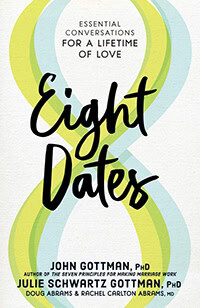
Julie: You can also go to Gottman Connect, which has fantastic modules that you can download, they’re really cool. Where John and I talked about a particular exercise, then we role play—there are videotapes on it—how not to do it and how to do it. Just for some fun and give lots of instruction in text and so on so people can really hone their skills in every domain of their relationship, including sexuality.
You can buy our latest book, which is Eight Dates: Essential Conversations for a Lifetime of Love. Each chapter focuses on what kinds of topics to discuss and particular questions to ask one another that pertain to parenting, conflict, how you like conflict to go, trust, spirituality, play and adventure, your future dreams. It’s just really lovely in terms really deepening your connection with one another and understanding each other better.
Of course, there is our foundational place for all things Gottman, which is gottman.com.
Wonderful.
John: Thank you, Stephan.
Thank you so much. This was fabulous. Listeners, please take advantage of this important information and apply it in your life. We’ll catch you in the next episode.

